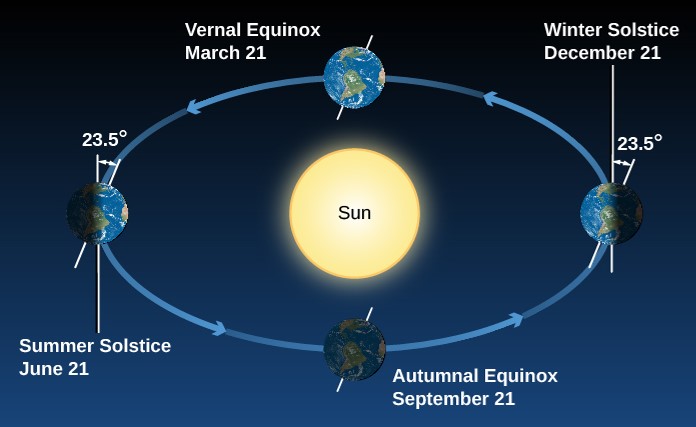As the Earth rotates around the sun at a tilted angle (23.5○), the sun rises and sets at a different time throughout the year. This effect of longer and/or shorter daytime is more prominent for people who live in the Northern and Southern hemisphere, including the USA.
 Earth axis around the sun
Earth axis around the sun
Source: Lumen Astronomy
A few weeks ago (Sunday, March 13th, 2022), we moved our clock forward by an hour, marking the start of Daylight Saving Time (DST) until November. There has been a mixed review on DST. This year, the vote against DST is even more apparent in the USA. The US Senate unanimously approved the Sunshine Protection Act to end the biannual clock change as soon as November 2023.
DST was used for the first time in 1916 during World War I, when Germany implemented a time change in order to reduce the use of coal (energy source) for lighting by extending daylight during productive hours. Britain and the U.S. soon followed this practice.
Fast forward in 1986, former President Ronald Reagan supported DST as he signed Public Law 99-359 on the basis that it would provide more daylight for outdoor activities and improve the economy – longer peak shopping hours, and overlap with the European market. Longer daylight also tends to promote a better mood. This is especially important for people who experience seasonal affective disorder.
Despite the benefit of having longer daylight, many people have pointed out the downside of changing the clock forward by an hour. Besides feeling robbed of an hour of sleep, how does DST actually affect us?
DST interferes with our circadian rhythm, an internal clock that governs our sleep-wake cycle. A disruption in the circadian rhythm, and the effect of sleep loss, could impact us at least for a week after the start of DST. Sleep deprivation could manifest itself in our mood, mental exhaustion, and increased traffic accidents.
Our circadian rhythm and meal time are also interconnected. With the change of an hour forward, we may find ourselves having a meal later in the evening. Consequently, for those who usually go to sleep early, this may affect their metabolism and digestion.
While we wait for the final verdict of the Sunshine Protection Act, some of the activities that we can do to alleviate the effect of sleep loss are: exercise for better sleep, spend time outdoors to adjust our circadian rhythm with the new daylight timing, avoid the use of electronics, and focus on meditation/relaxation prior to bedtime.
Peer edited by Joe Krzeski